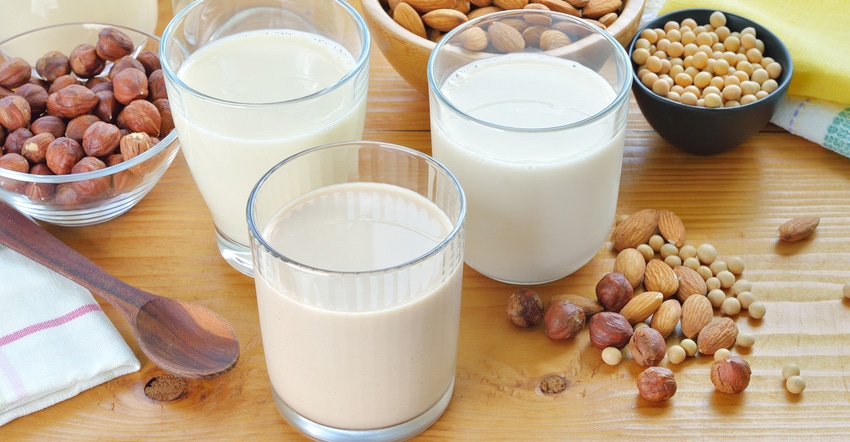July 23, 2018

Dairy farmers who want the term “milk” eliminated when referring to plant-based products such as almond milk or soy milk may soon get their way as the Food and Drug Administration plans to enforce the definition of “milk” as something that comes from a cow, not a plant.
FDA Commissioner Scott Gottlieb said last week that he intends to implement the change during the next year or so. The agency has long had a definition of milk as being an animal-based product, but it hasn’t been enforced.
“This has been a little bit of a bugaboo to the dairy industry,” Gottlieb said. “But we do have a standard of identity, and I intend to enforce that.”
Before the FDA can implement the change, there will have to be public hearings to gather comments, Gottlieb noted.
“It will probably take close to a year to go through that process. But that’s what we intend to do,” he said.
Sales of milk as a beverage have been in decline for years, while sales of plant-based beverages have increased more than 60% during the past five years, according to industry figures.
Last year, Sen. Tammy Baldwin, D-Wis., introduced the Dairy Pride Act, which would require the FDA to issue guidance for nationwide enforcement of mislabeled imitation dairy products within 90 days and require FDA to report to Congress two years after enactment to hold the agency accountable for this update in enforcement obligations. The omnibus spending bill Congress approved last spring also contains language expressing its concern that dairy labeling standards need to be properly enforced.
Baldwin says dairy farmers are facing challenging times due to low milk prices, the farm bill’s dairy risk management tools not working as well as they had hoped, and tariffs creating uncertainty in export markets and adding additional injury.
“I’m not saying this is the only problem,” Baldwin says of the mislabeling. “I’m saying there is a perfect storm of challenges to the dairy industry right now.”
Laurie Fischer, executive director of the American Dairy Coalition based in Green Bay, Wis., says the language has been confusing for consumers. The American Dairy Coalition’s membership includes large dairy farms and milk processors.
Dairy decline
Wisconsin lost 503 dairy farms in 2017 and 391 in 2016. In the first six months of this year, 338 farms in the state stopped milking cows, according to the National Agricultural Statistics Service’s Wisconsin field office in Madison.
Wisconsin has only 8,463 dairy farms left today, compared to 13,697 in 2008 and 22,387 dairy farms 20 years ago. In 1978, Wisconsin had 46,578 dairy farms.
“Dairy farms are going out of business at an alarming rate,” Fischer says, adding that sales of soy and almond milk have sped up the decline. “The dairy industry is taking a stand and saying ‘milk is milk.’ And we want to make sure that consumers understand what it is.”
We couldn’t agree more. In addition to nondairy products like almond milk and soy milk being mislabeled as milk, we find it appalling that consumers are being misled and are feeding these products to their children and families because they believe they are just as nutritious as real milk.
Real milk provides eight times more naturally occurring protein in every glass, is wholesome and simple, and is a minimally processed beverage. Real milk also has no added sugar. The sugar in real milk is lactose, which is a naturally occurring sugar. Many types of nondairy milk, such as almond milk, contain sugar. Tell that to your friends and family members who believe otherwise.
Last week, the American Dairy Coalition launched an effort aimed at persuading the FDA to not expand the definition of milk to include plant-based beverages. The FDA has scheduled a July 26 public hearing on that, and other matters, in Washington, D.C.
“It is crucial the dairy industry speaks up on the issue,” the American Dairy Coalition said in a statement. “We can no longer stand by” and allow plant-based beverages to be labeled as milk.
Comments? Email [email protected].
You May Also Like




